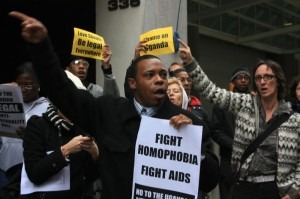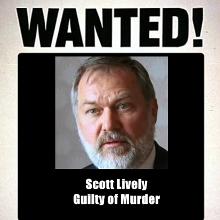
Many countries in Africa are known for their intolerant, anti-lesbian, gay, bisexual and transgender (LGBT) attitudes and policies. Uganda stands out in particular due to negative headlines. Article 31 of the constitution prohibits same-sex acts. A more stringent law to combat homosexuality has been introduced by parliamentarian David Bahati and is expected to be passed by parliament in the near future. Thanks to international pressure, the demand for the death penalty for same-sex intercourse has been averted. Author Peter Wiessner sheds light on the current situation in the country.
In focus: the role of the churches and the influence of the export of anti-gay ideas by fanatical fundamental Christians from the USA. This influence, sometimes referred to as "sex tourism by American evangelicals", has contributed to a culture of intolerance in Uganda and has long since taken on the function of a proxy war. Money is ringing in the coffers of Ugandan churches in droves: the more strident the anti-gay tones, the more abundant the donations from the religious right in the USA.
The Anglican Archbishop Orombe retired in mid-June 2012. He made a name for himself as the master builder of multi-million euro church buildings in the capital Kampala. Nobody really knows where the money comes from. Transparency is unknown in these circles. Many people in Uganda live on less than one US dollar a day. The archbishop has gained his power through good contacts in Washington and the acquisition of donations for church HIV projects. His anti-LGBT sermons and his vision of a gay-free world have been particularly well received by the religious right in the USA, who are unable to express these ideas publicly and unprotected at home. The more strident the anti-gay tone, the higher the sums of money flowing through Christian businessmen and politicians. The documentation "Call Me Kuchu" by Katherine Fairfax Wright and Malika Zouhali-Worrall sheds light on the mutual "win-win" situation of the connection between American churches and religious forces in Uganda and pays tribute to the murdered, openly gay activist David Kato.
There is hardly any resistance from Ugandan society in this clash of civilisations. evangelical leader Scott Lively from the USA was recently charged with crimes against humanity for his role in the fight for increased criminalisation of gays and lesbians in Uganda, but what good are symbolic acts like this if the sowing of hatred in Uganda itself falls on fertile ground, the churches profit from it, this greed for profit is hardly questioned and ethical-humanitarian questions are not asked?
Homosexuality is not a human rights issue in Uganda because it is illegal
"Homosexuality is not a human rights issue in Uganda because it is illegal," says parliamentarian David Bahati, insisting that Uganda must stand firm to counter the forces demanding LGBT rights. The bill he introduced aims to ban the advertising, recruitment and funding of same-sex marriages.
Even though the law has not yet been passed, it is beginning to have an impact: a few days ago, the Ugandan Minister for Ethics and Integrity announced that the government intends to ban 38 NGOs that are friendly to LGBT activities. The government had been leaked the minutes of a meeting of NGOs with the aim of considering a strategy for dealing with the stricter law. The minister described the activists as troublemakers who promoted a negative culture that was contrary to the legislation in Uganda. He was pleased with the list of NGOs present at the meeting because he now finally had the information he needed to combat homosexuality in Uganda.
The culture of ostracism, criminalisation and intimidation has an impact
The culture of ostracism, criminalisation and intimidation of LGBT people in Uganda has had a significant impact, including on access to treatment and prevention. Since the introduction of the anti-gay law in 2009, fewer gay men are accessing public health services and the law requires medical staff to disclose information about their patients' sexual identity to the police. Nurses are afraid to treat gay men for fear of legal repercussions. There are reports that gay men have been refused treatment in hospitals. Fear, discrimination and stigmatisation are obviously the order of the day.
To remedy this situation, activists opened the first clinic for LGBT people in May 2012. Bishop and gay activist Christopher Senyonjo opened the clinic with a church service: "Homosexuals and heterosexuals are equal before God," he said in his sermon.
It's good that there are also a few upright people among church people who do not participate in the spread of misinformation and intolerance.
But the fact that an extra clinic for LBGT is needed to avoid possible discrimination must give pause for thought.

